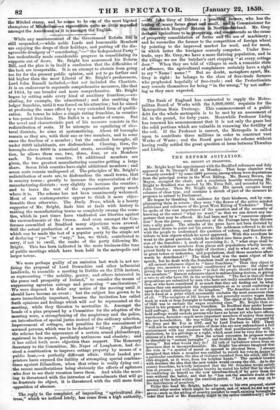While any announcement of the Government Reform Bill ia still
suspended,—while noble Lords and honourable Memberi While any announcement of the Government Reform Bill ia still suspended,—while noble Lords and honourable Memberi are enjoying the dregs of their holidays, and putting off the dis- agreeable drudgery of" considering,"—" the Independent Party" has undoubtedly made considerable progress in consolidating its
supports out of doors. Mr. Bright has announced his Reform Bill, and the plan is in itself a confession that the difficulties of the task are insuperable. It is an attempt to abstain from going too far for the present public opinion, and yet to go farther and bid higher than the most' Liberal of Mr. Bright's predecessors, Lord John Russell included,—but not included the Chartists. It is an endeavour to supersede comprehensive measures, like that of 1854, by one broader and more comprehensive. Mr. Bright began by setting aside every kind of auxiliary franchise,—ex- eluding, for example, the educational ; and also omitting the lodger franchise, until it was forced on his attention ; but he aimed at producing the same effect by a very extended form of qualifi- cation. In towns he takes a simple rating franchise, in counties a ten-pound franchise. The Ballot is a matter of course. But the novel and characteristic part of his measure consists in the redistribution of seats. If he attempts no equalizing of elec- toral districts, he aims at systematizing. About 40 boroughs remain as they are, with their one or two members, and in some cases the fraction of a member; but the smallest boroughs, all under 8000 inhabitants, are disfranchised. Classing, then, the boroughs above 8000 in numerical strata, according to popula- tion, he allows them one, two, three, four, or six Members each. To fourteen counties, 18 additional members are given, the two greatest manufacturing counties getting a large share. Seven Irish counties have eight additional members ; and seven seats remain undisposed of. The principles of Mr. Bright's redistribution of seats are, to disfranchise the small towns, that is country towns ; greatly to increase the representation of the manufacturing districts ; very slightly to increase the counties ; and to leave the rest of the representation pretty much where it is. The scheme has not been unanimously welcomed. Most of our contemporaries appear to think it more objec- tionable than otherwise. The Daily News, which is a hearty supporter of Mr. Bright, finds him at fault with history in making the manufacturing towns so completely swamp the coun- ties, which in past times have vindicated our liberties against the encroachments of the Crown. And even amongst the Con- ference assembled at Bradford many objections were avowed. Still the actual production of a measure, a bill, the support of which can be made the test of a popular party by the simple act
of declaring " yea " " nay," has, we think, contributed to serry, if not to swell, the ranks of the party following Mr. Bright. This has been indicated in the more business-like tone of public meetings which have been held in the metropolis and larger towns.






























 Previous page
Previous page